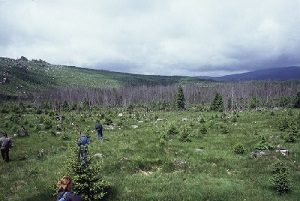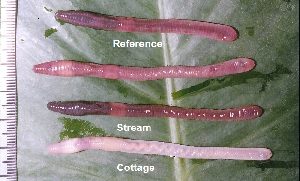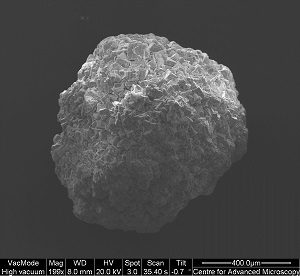Profile
Mark Hodson
Just realised I can do this status thing - amazed I wasn't the first out, thanks for the votes, keep them coming!
-
Read more
I’m in my early 40s, have a wife and two young children, live in York and work at the Environment department at the University of York. We moved here recently from Reading where I worked in the Geography and Environmental Science department. I’m a keen musician and like climbing mountains.
Work wise I try and find out how the environment works. In the past I’ve worked on acid rain and contaminated soil. At the moment I do a lot of work with earthworms. The underlying theme of my work is to try and use chemistry, biology and physics to understand how our planet works and the environment functions. You can read more about my research on my website at https://sites.google.com/a/york.ac.uk/mark-hodson/
The work I did on acid rain investigated how much acid rain could land on soil before the soil was damaged. When acid rain lands on soil the acid is neutralised when it reacts with minerals (ground up rock) in the soil. If the minerals react fast enough the soil isn’t damaged by the acid rain. So I spent three years working out how quickly minerals react in soils and therefore how much acid rain could happen before the environment was damaged. These ideas (not my work) are the basis for international legislation on acid rain and are a great example of how science influences politics. The photo shows an area known as “The black triangle“. It is at the borders of the former East Germany, former Czechoslovakia and Poland. The acid rain there was very bad due to the high sulphur content of the coal they used and burnt the leaves off the trees.
The contaminated land work focussed on how to clean up poisoned soil so that it could be used again. At the moment, most soil that is contaminated by accidents or former industry is landfilled – they call it dig and dump in the industry. This isn’t very sustainable so we investigated ways of changing the soil chemistry so that the poisonous metals were no longer poisonous. We did this by adding stuff (ground up cow bones!) to the soil which reacted with the metals to form insoluble, inert compounds. It works well in the lab. but it is still so cheap to dig up contaminated soil and throw it away that currently it isn’t being used commercially.
The contaminated land work led on to working with earthworms, initially using earthworms to assess whether land was poisonous or not – do earthworms live there or not but later on doing all sorts of stuff. At some of our contaminated soils we found weird looking earthworms so we did some work on their evolution and survival in poisonous soils. The photo shows some earthworms I’ve worked on with Pete Kille and John Morgan from Cardiff University and Jane Andre, now at Lancaster, it’s easy to spot the mutant earthworm! I’ve also started doing some work on earthworm poo – they secrete balls of calcium carbonate that we can potentially use to determine the temperature of the planet in the past and therefore test climate change models – and looking to see whether earthworms increase or reduce the amount of greenhouse gases (carbon dioxide, nitrous oxide and methane) that comes out of soils.
Here’s an image of one of the balls of calcium carbonate that earthworms produce in their poo. It’s about 2 mm in diameter. Think about the diameter of an earthworm then scale them both up to human size – a painful thought!
-
My Typical Day:
Boiling stuff in a test tube, digging up earthworms, teaching students about the environment – lots of variety sums it up.
-
Read more
The joy of my job is that really and truly there’s no such thing as a typical day. As a scientist employed as a lecturer at a University my work has three interrelated strands: teaching, research and admin. So my days are filled with:
1) teaching students in lectures, practical classes, tutorials and seminars,
2) helping my research students and research assistants do research (and occasionally getting into the laboratory myself- as a fairly senior member of staff I have less time to play in the lab. than I used to which is not so good but the flip side is that I get involved in a wide range of research working with my students and research assistants, planning experiments and helping them interpret their results).
3) carrying out various administrative tasks necessary to help the department run, for example discussing with colleagues what we should teach, inviting guest lecturers to visit, discussing whether we should buy new equipment for the laboratories.
So as an example today I spent some time designing some experiments with a research student to investigate using magnetic nanoparticles to extract toxic metals out of soils, I spent some time marking student course work, I spent some time at a seminar hearing about a new computer model someone has developed to see whether the UKs declining bat population is due to bats eating insects that in turn have fed on metal contaminated soil, some time with another student working out why their experimental results didn’t make sense (we found out – they’d made a mistake in some of their sums) and some time trying to persuade someone to give me some money to do experiments to work out whether earthworms are killed during droughts.
Another typical day I’ve spent time with a student discussing how to work out the size of particles in soil, some time chasing a delivery company who have left some lab equipment that we need for an experiment at the wrong address, some time discussing public lectures that we could put on at the University and (yet more) time trying to get people to give me money to do experiments on earthworms and droughts.
Everynow and again I fill in a blog (http://darwinsplough.blogspot.co.uk/) describing what we’ve been up to but this is usually only when there is something exciting / photo worthy to report.
-
What I'd do with the prize money:
Talk at schools and participate in science festivals
-
Education:
Most of the schools I attended have been closed but I try not to get paranoid about it! I went to school in Mansfield, a smallish town near Nottingham. So in order: Carter Lane Infant school (now closed) 1974-5; Berry Hill First school (now closed) 1975 – 1979; Berry Hill Middle school (now closed) 1979 – 1983; Sherwood Hall comprehensive school (now closed) 1983 – 1988. Then University: Oxford University (1988 – 1991) and then Edinburgh University (1991 – 1994)
-
Qualifications:
The one I’m most proud of is called an ALCM (perf) which stands for Associate of the London College of Music in Performance, kind of a professional music qualification. At School I did GCSEs in biology, chemistry, physics and geography amongst others and A levels in biology, chemistry, physics and maths. At University I did a degree in geology (rocks). Like most scientists working at a University I then went on to do a second degree called a PhD. This takes three years and involves doing research. You get paid to do it, so it’s a bit like having a job. Passing a PhD allows you to put Dr in front of your name. My PhD investigated how molten rock solidifies below volcanoes and involved travelling to all sorts of places I’d never have got to otherwise including Greenland, South Africa, Turkey and America.
-
Work History:
My first job was in Aberdeen at a research institute called the Macaulay Land Use Research Institute. I worked on the impact of acid rain and the job lasted 3 years (1995 – 1998) which is a fairly typical contract. When you’re employed after you get your PhD or doctorate you’re known as a post-doc. Then I worked at the Natural History Museum in London for about a year and a half working on ways to clean up contaminated soil. I then moved to the University of Reading to a permanent job as a University lecturer. I was there for 13 years. recently I’ve moved to the Environment department at the University of York.
-
Current Job:
I’m a Professor in the Environment Department so I do lots of different stuff. Some of my time is spent teaching undergraduates about the environment, some of the time I help postgraduate students (i.e. people who have done a first degree and are now doing a degree that involves three years of research), I get involved in helping to run my department and I do my own research, trying to understand how our environment works.
-
My Interview
-
Were you ever in trouble at school?
Nope, I just got on with things and didn’t rock the boat.
Who is your favourite singer or band?
I have quite eclectic tastes in music. A CD player is the most important bit of laboratory equipment I have and typical music ranges from Radiohead, Muse, Bjork, Pucinni and Philip Glass
What's your favourite food?
I’m a big fan of junk food. There was a pasty shop at the Univesity of Reading that shut after I moved to York and there’s probably a direct correlation. My favourite pasties were the “all day breakfast” which had beans, egg, sausage and tomato in it and a haggis pasty – heaven!
If you had 3 wishes for yourself what would they be? - be honest!
I guess world peace and an end to global warming sound to goody goody. To do research you have to persuade someone to give you the money to do the experiments you want to do. This is very time consuming and there is never enough money so top of my list of “selfish” wishes would be to have unlimited funding to do whatever research I wanted. A second would be to have sufficient time personally together with sufficient research students and research assistants to do the research. Work wise I’m struggling for a third science related one so I’ll go for still being able to beat my children at table football when the’re teenagers.
Tell us a joke.
This doesn’t really work written down. “Knock, knock” “Who’s there” “Interupting sheep” “Interupting sheep who” but you have to shout “Baa” half way through the “Interupting sheep who” bit
-



